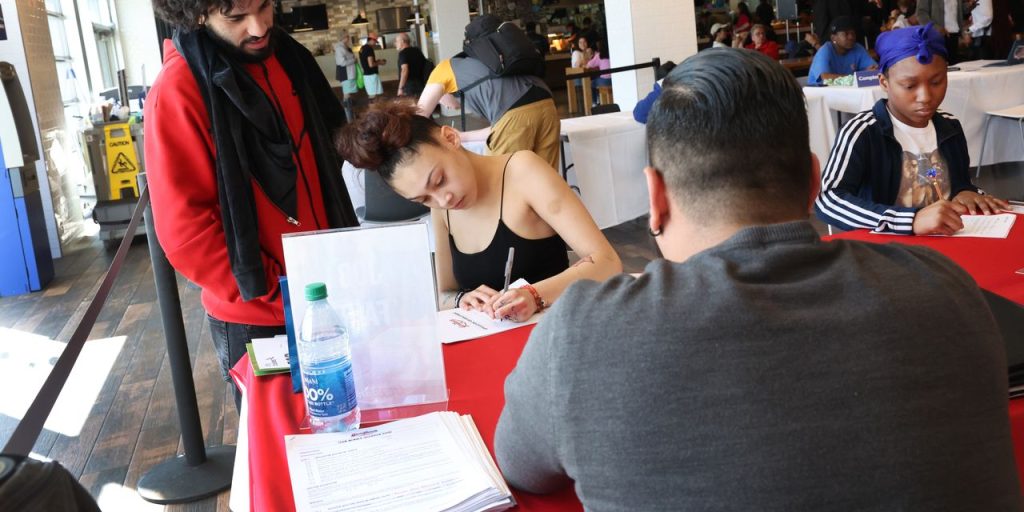Many noncompete agreements that employers make staffers sign to bar them from leaving to take certain jobs with rivals or in nearby markets violate federal labor law, says one of the government’s most senior labor lawyers.
The widely-used noncompetes can make workers hesitate about threatening to resign to improve job conditions and pay or carrying through on the threat, said Jennifer Abruzzo, general counsel of the National Labor Relations Board.
With her Tuesday memo, Abruzzo joined the Biden administration’s criticism of noncompete agreements and dialed up the fight with business groups who say the agreements are needed and can be reasonably used.
“Non-compete provisions reasonably tend to chill employees in the exercise of Section 7 rights when the provisions could reasonably be construed by employees to deny them the ability to quit or change jobs by cutting off their access to other employment opportunities that they are qualified for based on their experience, aptitudes, and preferences as to type and location of work,” Abruzzo said in the memo.
She added that, under noncompete clauses, “workers know that they will have greater difficulty replacing their lost income if they are discharged for exercising their statutory rights to organize and act together to improve working conditions; their bargaining power is undermined in the context of lockouts, strikes and other labor disputes; and their social ties and solidarity leading to improvements in working conditions at workplaces are lost as they scatter to the four winds.”
Earlier this year, the Federal Trade Commission proposed a rule to ban noncompetes. The pacts — often included in the paperwork workers sign just as they start their job — boiled down to unfair competitive practices because they stymied job markets and wages, the FTC said.
Around 30 million workers are bound by the agreements and a ban letting workers freely move to another job could boost their collective wages by $50 billion annually, from around $250 billion to almost $300 billion, according to FTC projections.
The National Labor Relations Board is focused on private-sector workers’ rights to organize and collectively bargain. From Abruzzo’s view, noncompete agreements, with some limited exceptions, are a problem because their potential chilling effects interfere with workers’ rights to band together and press their employers.
As general counsel, Abruzzo’s office plays a role like a prosecutor who brings unfair labor cases in front of the board. Her memo is addressed to officials inside the agency.
It’s too soon to say what the practical effects could be, said Alan Benson, a professor at the University of Minnesota’s Carlson School of Management who studies the economic angle for personnel and human resources.
Abruzzo “is giving this legal guidance that you have support from the top,” he said.
But that’s just the start, he noted. The agency’s staff needs to learn of specific allegations from workers, they need to decide the cases are worth pursuing and they need to press the case through the NRLB’s administrative law judges and its board’s members.
“The idea of a chilling effect is fuzzier than direct retribution” for trying to unionize or improving pay and work conditions, he noted.
The memo is already stoking the tension with business groups that think the feds are going too far.
The FTC rule is pending and the U.S. Chamber of Commerce has said it is prepared to sue the regulator to block a rule if necessary.
Noncompete agreements can help businesses in ways that trade secret laws and nondisclosure agreements cannot, the business group said. Besides, there’s already an array of state laws tailoring how and when the agreements can be used, it noted.
Three states void noncompetes for almost all workers, California, North Dakota and Oklahoma. More than 10 others say noncompetes can’t apply above certain income thresholds. Critics say that still doesn’t stop their proliferation.
On Wednesday, the U.S. Chamber of Commerce criticized Abruzzo’s memo.
“Whatever one thinks about the merits of noncompete agreements, every American should be disturbed by the idea that one government lawyer can simply decide that noncompetes are unlawful and therefore with the support of three commissioners declare illegal an employment practice that has legally existed for over 200 years,” said Neil Bradley, the organization’s executive vice president and chief policy officer.
“The U.S. Chamber of Commerce will utilize all available tools to fight this extreme and blatantly unlawful overreach,” Bradley added.
On the other side, an FTC official said she appreciated the support against the agreements. “We are glad to see the NLRB confirm that noncompetes could violate federal labor laws,” said Elizabeth Wilkins, director of the FTC’s Office of Policy Planning.
“Their announcement reflects a much needed whole-of-government approach to making the economy work better for American workers,” Wilkins said.
With all the back and forth on what the Biden administration can and cannot do about noncompetes, there’s also a pending bill to curtail the agreements.
The bipartisan “Workforce Mobility Act” would confine noncompetes so they would only be used for circumstances like dissolving partnerships and selling businesses.
Senators Todd Young, a Republican from Indiana, and Chris Murphy, a Democrat from Connecticut, reintroduced the bill in February, after the FTC announced its proposed ban.
Read the full article here
